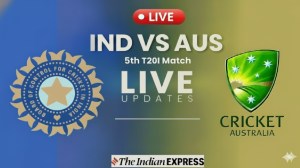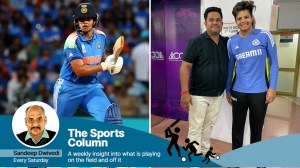A girl for bad hair days
If you are a woman of African origin in Delhi,life is tough. Not just because your neighbour has discovered the vuvuzela or that you get stared at on the street....
If you are a woman of African origin in Delhi,life is tough. Not just because your neighbour has discovered the vuvuzela or that you get stared at on the street. Theres a trickier one: where do you get your hair done?
what would the small community of African women diplomats in Delhi do without Ester Ngulube? The 27-year-old woman with a shy smile and nimble hands is,in Indias aloof national capital,no less than a lifesaver. Shes a hairdresser. And what woman has faced the world without one?
Among the many pinpricks of life in India for a woman of African origin,the unfamiliar food,the unspoken discrimination,the stares on the street (the waka-wakas havent changed that one bit),is a matter of personal frustration. The many swish salons that dot south Delhi dont do African hair. They dont know how to handle the unfamiliar brittle texture,untangle the tresses and let them relax,or braid them into tracks of neat cornrows.
So the women land up at Ngulubes three-storied house in Vasant Vihar where she stays with her Zambian diplomat parents. Her bedroom doubles as her salon. This will take me all day, she says with a smile as she furiously braids away the hair of her 14-year old customer. I enjoy doing peoples hair, she says. Its not a business for me. I do it based on my personal relationship with the ladies, she says.
Traditionally,hairdressing in Africa has always been the work of trusted friends or experienced relatives. African hair,unlike Indian hair,is extremely brittle,curly and grows very slowly. It grows in a tiny spring-like structure,has fewer hair shafts compared to straight hair,and the texture appears to be denser,dry and coarse. Its shape and texture make it prone to breakage,making it very difficult to maintain. In most African and African-American societies,hair is an integral part of exterior beauty,and a matter of great personal pride. Damaged or unkempt hair could become the source of mockery of the person and diminish their social standing.
Forty-year-old Winnie G. Tlhobogang is from Botswana and has been living in Delhis posh diplomatic area Vasant Vihar for over a year now. Despite the abundance of luxury salons and spas in the locality,Winnie is yet to find a hairdresser who can service her waist-long hair. She is one of the many African women who face the same problem.
I have been growing my hair for six years now,and have been very patient. Naturally,I dont want to risk going to an inexperienced hairdresser, she says. As of now,Delhi has almost no salons that can cater to their needs. When I first got here,I tried searching for a salon with my friends. I was not successful and it has been very inconvenient, she sighs.
When African women come to Delhi,they suffer, she says. Hair is so important to an African womans beauty,her confidence. Women like me who are secretaries at an embassy,and have to meet a lot of diplomatic dignitaries,need to look sharp and fresh, she says.
The Lakme Training Academy in Delhi and Mumbai give diplomas in advance hair treatment,but do not specifically work on Afro hair. This,they say,is because there arent many African models on whom they can practice. Affinity,a premium salon,also does not have any services for African hair. Save one hairdresser,Kala Yadav,at one Ambika Pillai salon in south Delhi,who did a one-week course in Paris for foreign hair,there are no hairdressers with the technical skill to cater to African womens needs. Yadav charges almost Rs 3000 for services that would cost Tlhobogang and friends around Rs 1,000-Rs 1,200 back home. Here,they sometimes also risk hair damage because of the salons limited knowledge.
Twenty-three-year-old Rose Lulu is another of Ngulubes regular customers and is visiting her during her college holidays. Back home in Kenya,doing my hair would cost around Rs 500,but here its nothing less than Rs 1,500, she says. Lulu is currently an undergraduate student in Allahabad University and has been in India for almost a year.
Ngulubes sister Clara,a student of Jesus and Mary College,says she would never get her hair done by a stranger. When Ester was not here,I had to go to the salons here to get my hair straightened. That they can do but it cost me a lot. But they dont have the right products for our hair, she says.
There are no African hair care products in the Indian markets, says Lulu. If we use your shampoos or gels,our hair will get tangled and break a lot. You may even have to chop that section off. And it takes so long to grow the hair. Cutting it is very painful!
Ngulube,who charges between Rs 1500 and Rs 4000 depending on the style,is a safer optioneven though she accepts a maximum of two clients a day. Cornrows,a hairstyle where the original hair is braided alongside the scalp in thick plaits,takes her three to four hours. Weaving or pick and drop,is when hair extensions are braided into tiny strands of the original hair. It is the most cumbersome hairstyle, she says. It can take me anywhere from 12 hours to even four days. It depends on the complexity of the hair and the number of braids. Some people have hundreds,some want thinner ones,so they have thousands of braids.
Though this is a market over which she has a monopoly, Ngulube wishes Indian salons were Afro-friendlier.
Doing our hair is not so difficult, she says. It only requires learning very little technique. Even if the salons here could offer the basic services,it would help a lot of women, she says.
She used to run her own salon back home in Zambia. But,she is apprehensive of opening one in Delhi,even though it would bring more business to her. It is very difficult for outsiders to start up a business here, she says. Theres so much red tape,and everyone asks for so many official documents,and renting a place here is very expensive.
Another hairdresser who used to run a salon out of her home,left for USA last year. That increased her workload by double. If I had a salon here,I could hire more girls to help me out. I could even train people how to do African hair, she says.



- 01
- 02
- 03
- 04
- 05



























